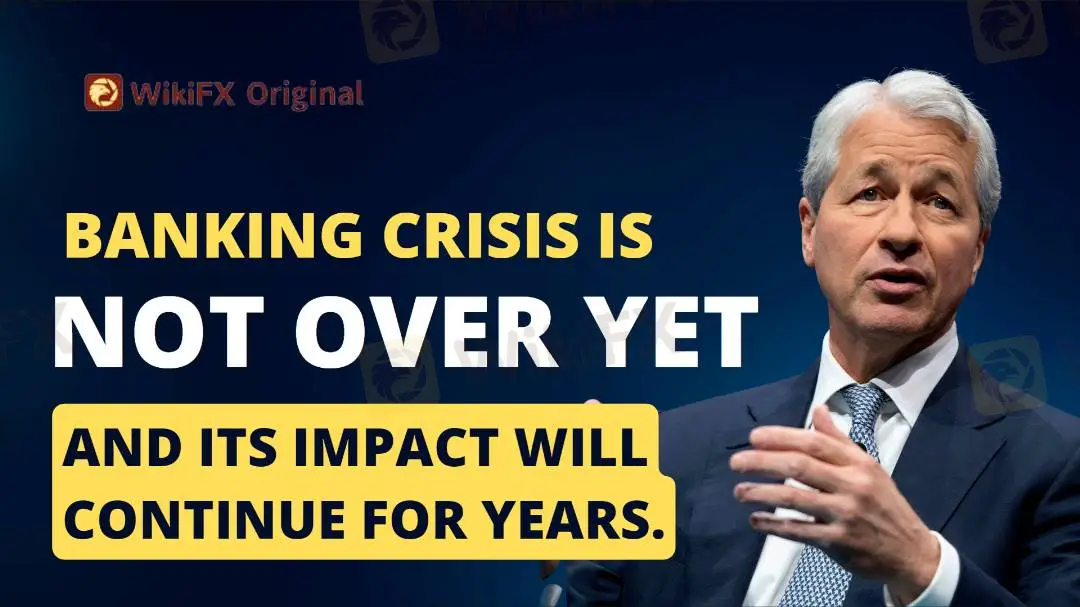Abstract:On Tuesday (April 4th), JPMorgan CEO Jamie Dimon stated in his annual letter to shareholders that the banking crisis triggered by the collapse of Silicon Valley Bank is far from over and will continue to impact the industry for years to come.

Dimon wrote, “As I write this letter, the current crisis is not yet over and, even when it is, it will continue to have repercussions for years to come.”
Last month, the collapses of Silicon Valley Bank and Signature Bank sparked a banking crisis that swept across Europe and America. Switzerland's second-largest bank, Credit Suisse, also became a casualty of this crisis and was ultimately acquired by its main competitor, UBS Group.
Dimon pointed out that the banking crisis will make banks more conservative and lead to tighter credit conditions. However, he also stated that the recent banking crisis is completely different from the 2008 financial crisis, which hit large banks, mortgage lenders, and insurance companies, whereas the current crisis involves far fewer financial participants and issues to be resolved.
In the recent banking crisis, regional US banks bore the brunt of the pressure. While investors and analysts generally believe that the too-big-to-fail banks will benefit from this crisis, Dimon stated that JPMorgan hopes to strengthen the smaller banks to benefit the entire financial system.
Dimon wrote, “Any crisis that damages Americans' trust in banks damages all banks. While this banking crisis has indeed been a 'benefit' for big banks, as they have received a lot of deposits flowing in from smaller institutions, any notion that this crisis has been good for them is absurd.”
Discussion on Regulatory Reform
After the outbreak of the banking crisis, there was a strong call to strengthen banking regulation, and the Federal Reserve was criticized for not fulfilling its regulatory responsibilities adequately. The U.S. Congress is considering a series of bills, including repealing the 2018 law that relaxed regulation of neutral banks.
According to Jamie Dimon, any new regulatory requirements should be carefully considered, including clearer rules for dealing with bankrupt banks. He wrote, “The recent failures of Silicon Valley Bank and Swiss Credit, as well as related pressures on the banking system, highlight that meeting regulatory requirements alone is not enough. Risks are diverse, and managing these risks requires continuous and vigilant review as the world evolves.”
Dimon pointed out that lawmakers should find ways to boost small and medium-sized banks and make regulation more effective. It was the failure of federal regulators to prevent bank failures and the Federal Reserve's stress tests not considering rising interest rates that ultimately led to the collapse of Silicon Valley Bank.
Dimon explained, “This is not to absolve bank management, but rather to point out that this is not the best time for many participants. When the market, rating agencies, and depositors are paying attention to them, all these conflicting factors become critical.”
Discussing Artificial Intelligence
In the letter, Dimon also mentioned the recent hot topic in the market - the rise of artificial intelligence (AI). While JPMorgan Chase has already started using AI, Dimon emphasized the importance of using this technology with caution.
Dimon wrote, “We take very seriously the responsible use of AI, and have a cross-disciplinary team of ethicists to help us prevent unintended uses, anticipate regulation, and promote trust with our clients, customers, and communities.”
WikiFX's commitment to providing traders with comprehensive information and resources to help them succeed in the forex market. Access our comprehensive broker database, client feedback system, and regulatory information on the go. Download the WikiFX app today and make informed trading decisions anytime, anywhere.










